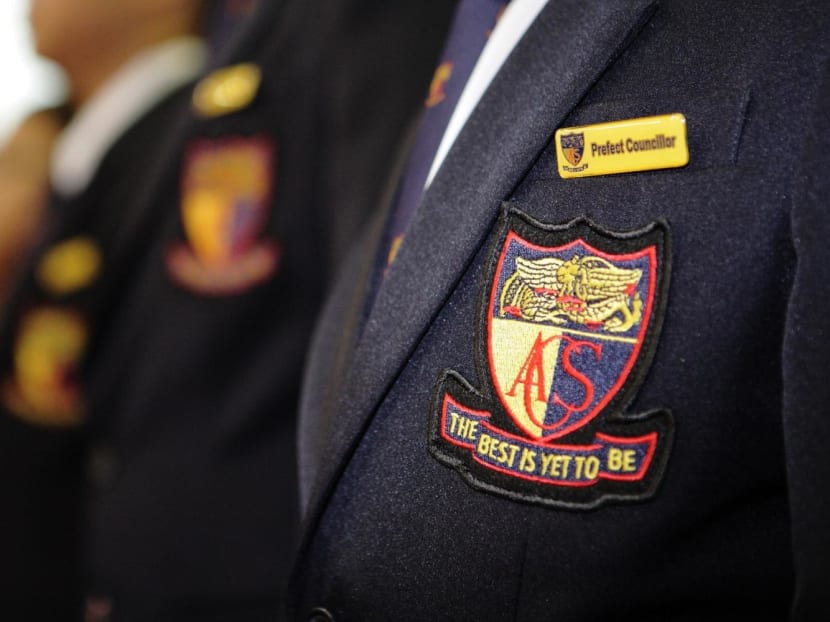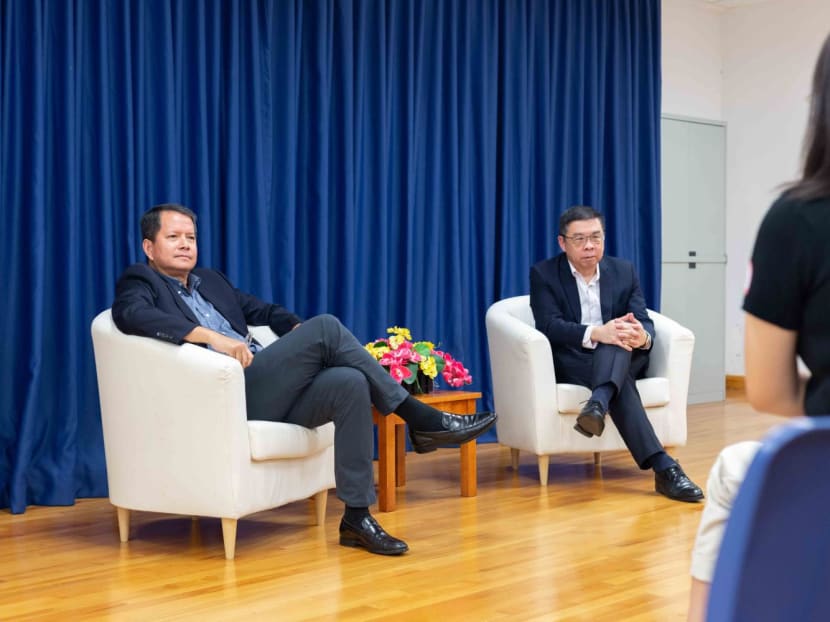Building 'a more inclusive society' among reasons behind decision to relocate and run co-ed, special education schools in Tengah: ACS
SINGAPORE — Moving its primary school on Barker Road to the more socially diverse area of Tengah and establishing a special education school were in line with the vision of the Anglo-Chinese School (ACS) in helping to build a "more inclusive society", its leaders said.

Anglo-Chinese School (Primary) will relocate to Tengah and co-run a special education school.
- Anglo-Chinese School said that moving ACS (Primary) to the socially diverse area of Tengah and setting up a special needs school there were both in line with its vision for more inclusive education offerings
- ACS announced on Feb 9 that ACS (Primary), now a boys' school, would move to Tengah and allow girls to be enrolled
- It would also set up a special needs school that would eventually be in the same location
- The chairman of the ACS board of governors described the development as "a humbling opportunity to serve humanity"
SINGAPORE — Moving its primary school on Barker Road to the more socially diverse area of Tengah and establishing a special education school were in line with the vision of the Anglo-Chinese School (ACS) in helping to build a "more inclusive society", its leaders said.
Both these steps embraced the objective of providing more inclusive education offerings in its role as one of Singapore's mission schools, ACS said after unveiling the twin moves on Thursday (Feb 9).
Mr Richard Seow Yung Liang, chairman the ACS board of governors, said that the relocation of ACS (Primary) from the prime district of Bukit Timah to Tengah new town in the western part of Singapore to serve a new neighbourhood as a co-ed school means that ACS will "serve more students' educational and co-curricular needs".
"This achieves a more inclusive educational offering as one of Singapore's mission schools.”
ACS added that the new special education school will cater to the growing demand for students with moderate special educational needs who have autism spectrum disorder and can have access to the national curriculum.
There are now four schools that cater to such students.
Mr Seow said: "With access to resources and cutting-edge special education pedagogies, we aim to contribute to the uplifting of special education in Singapore.”
'HUMBLING OPPORTUNITY TO SERVE HUMANITY'
The special education school, which is yet to be named, will begin operations at an interim site that previously housed Chua Chu Kang Secondary School.
It will then relocate to a permanent campus at Tengah, which will tentatively be ready in 2031, next to the upcoming ACS (Primary), which is moving from its current location on Barker Road to Tengah in 2030.
Mr Seow said that this move is a vision that the ACS board of governors has had “for a long while now”.
“We are truly appreciative that our constant discussions with the Ministry of Education (MOE) over the years have culminated in this humbling opportunity to serve humanity in a new way.”

ACS runs two primary schools: ACS (Primary) on Barker Road, which offers the Gifted Education Programme, and ACS (Junior) on Windstedt Road in the Newton Road area, as well as three secondary schools and a junior college.
Under the national curriculum, the Gifted Education Programme allows intellectually gifted students to have the same education as those in the mainstream system, but with extra subjects and greater exposure to varied learning experiences.
Speaking to the media on Thursday afternoon, Mr Seow said that discussion over plans to relocate the school began about a year ago.
This happened while the school was in discussions with MOE on how it could give back to the community. MOE had suggested that the primary school relocate to a new site.
Mr Seow said that the board accepted the idea because it "would want to bring the ACS education" to a range of communities.
He added that the relocation would leave a "lasting legacy" for the school, since it would allow the school to share its brand of education with the community.
Mr Seow said that with the move, families who are unable to afford a property near its current premises would have greater access to the school, thereby diversifying the socio-economic profile of its students.
In a letter to alumni on Thursday, the school said that the move was initiated after the school expressed its desire to MOE to serve the needs of the heartland community and inject more diversity into its student profile, especially the Primary 1 intake.
It said that Tengah is likely to have "a diverse population comprising people of varied socioeconomic, ethnic and religious backgrounds".
The move will help the school strengthen its commitment to its mission of serving the community and bringing quality education to a wider cross-section of society.
The letter was signed by Mr Seow, Mr Lock Wai Han who is president of the ACS Old Boys’ Association, and Dr Gordon Wong, bishop of the Methodist Church in Singapore.
PAVING THE WAY TOWARDS 'A MORE INCLUSIVE SOCIETY'
Ms Junie Foo, chief executive officer of Methodist Welfare Services, said that the partnership aligns with the organisation's values to empower people.
“We hope to support the students holistically through our range of psychosocial and emotional care services, family life education, as well as physical and occupational therapy," she added.
“We believe this sowing into the next generation will pave the way towards a more inclusive society.”
The new special education school will be on an adjoining compound to the primary school in Tengah and will share facilities with the primary school.
There will also be some joint events and programmes between the schools, Mr Seow said.
“We believe this sowing into the next generation will pave the way towards a more inclusive society.Ms Junie Foo, chief executive officer of Methodist Welfare Services”
This will be exemplified through greater interactions and opportunities for students from both schools to interact through joint activities and academic learning.
It will also serve in fulfilling ACS' goal of providing “an all-round education in an environment which seeks to bring out the potential of every pupil to the fullest”.
FINAL DECISION TO MOVE ACS (PRIMARY) MADE ON FEB 7
Speaking to the media on Thursday afternoon, Mr Richard Seow Yung Liang, chairman of the ACS board of governors, said that the final decision to relocate ACS (Primary) to Tengah was made on Tuesday (Feb 7) at a board meeting.
However, parents of current students were not consulted before the decision because the school did not want to reveal "material price-sensitive information". This was a reference to the probable impact on property prices in Tengah.
"You want to basically have all the facts done, and then you go. So it was not possible to bring in everyone before the decision... unfortunately, we could not.
"But we think that is a good, good move for the school," Mr Seow said.
He added that discussions with the Ministry of Education (MOE) to relocate the school started about a year ago. Plans to make the school open to girls and not just boys came up after Tengah was raised as a possible location.
As for the discussions to relocate, they came about because the school had been thinking of ways to share ACS with "many different communities" and the chance to move to Tengah "was one of the best opportunities (the school) had".
Since the primary school is the smallest school under the ACS banner, relocating would also give it space to expand its facilities.
ACS (Primary) offers the Gifted Education Programme, so Mr Seow said that the board also wanted it to be available to children in Tengah.
Plans to establish a special education school began much earlier, about 10 years ago.
Mr Seow also said that ACS probably has one of the largest cohorts of special needs children in mainstream schools and has wanted to invest in special needs education.
However, it took a decade to convince MOE.
"Now that (the ministry has) invited us to do it, we are ecstatic," he said.











